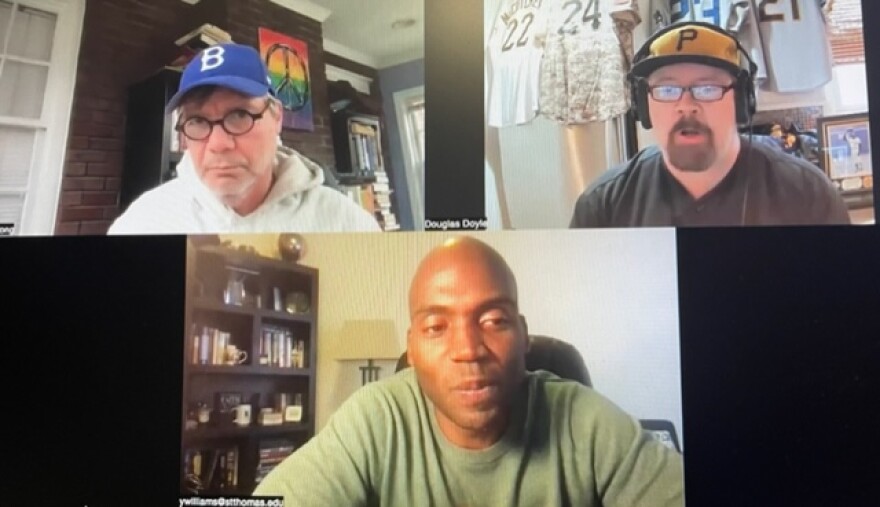2022 marks 75 years since Brooklyn Dodgers great and Hall of Famer Jack Robinson broke the color barrier in Major League Baseball, and the 50th anniversary of his death (Oct 24th). In light of these historic milestones Dr. Yohuru Williams and Michael G. Long bring us a different portrayal of this barrier-breaking American hero, and proud lifelong fighter for Black justice in Call Him Jack: The Story of Jackie Robinson, Black Freedom Fighter (Farrar, Straus and Giroux, 2022).
Co-authors Dr. Yohuru Williams and Michael G. Long join SportsJam with Doug Doyle to share stories about Jack Robinson that many
young and others have not heard about. Both Williams and Long appeared in the Ken Burns documentary Jackie Robinson.

Dr. Yohuru Williams is a Distinguished University Chair, Professor and the Founding Director of the Racial Justice Initiative at the University of St. Thomas in St. Paul, Minnesota. He's the former chief historian of the Jackie Robinson Foundation. Dr. Williams, who lives in Minnesota, is also the author of numerous books, including Teaching U.S. History Beyond the Textbook.
"People really freeze him (Jack Robinson) in that 1947 moment, that passive moment (breaking the MLB's color barrier), we wanted to shatter that. Jack Roosevelt Robinson is a very compelling individual if you dig beneath the surface, the invention of Jackie, and you get to the man who was Jack."

Dr. Williams says hearing racial slurs from the stadium stands weren't anything new to Robinson.
"The reality is none of that would be foreign to Jack Robinson. In fact, Jack had experienced that from his hometown fans. People who were supporters of UCLA used far more abusive language when Jack to the field, and they were presumably rooting for UCLA. The story really is his ability to compartmentalize that, and to recognize that in addition to having that tremendous opportunity, this was also an opportunity for Black people. That speaks volumes to his character."
Michael G. Long, who lives in Pennsylvania, is the author and editor of several books on Jack Robinson and civil rights history. Long's op-ed pieces about Robinson have been published in many national media outlets such as the Los Angeles Times, the Chicago Tribune, and ESPN. This is his fourth book about Jack Robinson.
"What we wanted to do was to introduce young readers to a more threatening Jack Robinson. You know it was very difficult for Robinson to be nonviolent. He wasn't naturally nonviolent. He wasn't a pacifist by any stretch of the imagination. He was a fierce fighter. He had a strong backbone. Beyond those first few years in Major League Baseball, this guy was just ferocious in defending his rights and the rights of other Black people. The book is targeted for anyone fro 10 years old to 110 years old."

Long thinks the racism that Robinson faced throughout this life could have resulted in Jack dying at the age of 53 from a heart attack. Robinson also struggled with diabetes and heart disease.
"There's actually an article written by doctors about the role that racism probably played in the early death of Jack Robinson. I can't imagine that it didn't . This is a guy who would go out on the field and compile Hall of Fame statistics, but do it under this enormous pressure. There would be people in the crowd who wanted to shoot him. He would get death threats. He would perform under intense circumstances. I can't imagine that didn't weigh heavily on him, that it did not have some sort of physical manifestation on his body. So do I think that racism played a role in his early death, you're damn right I do."
Call Him Jack also addresses the relationships Robinson had with Malcolm X and Dr. Martin Luther King Jr. In the book, co-authors Long and Dr. Williams also talk about the importance of Jack's mom Mally and his wife Rachael in Jack's success and pride in being a Black man.
You can SEE the entire SportsJam interview with Michael G. Long and Dr. Yohuru Williams here.




